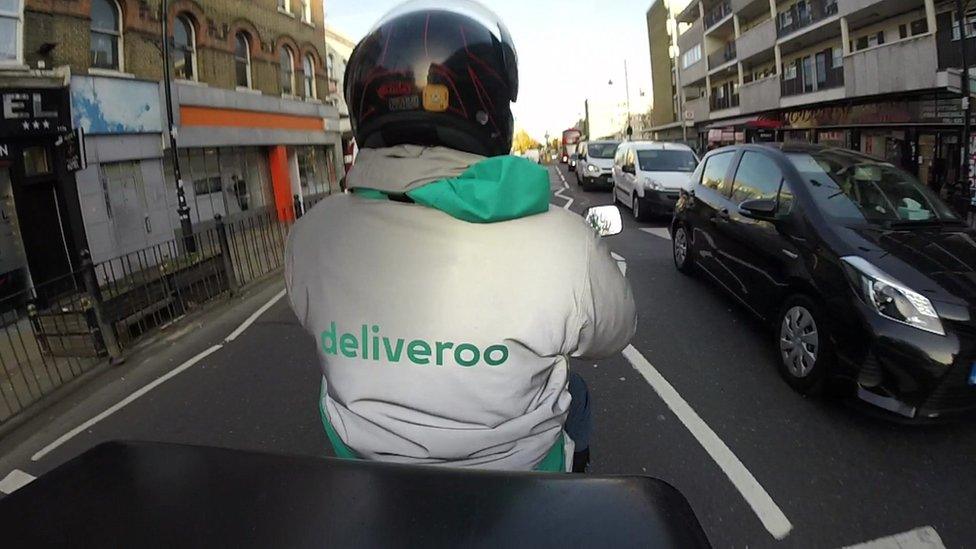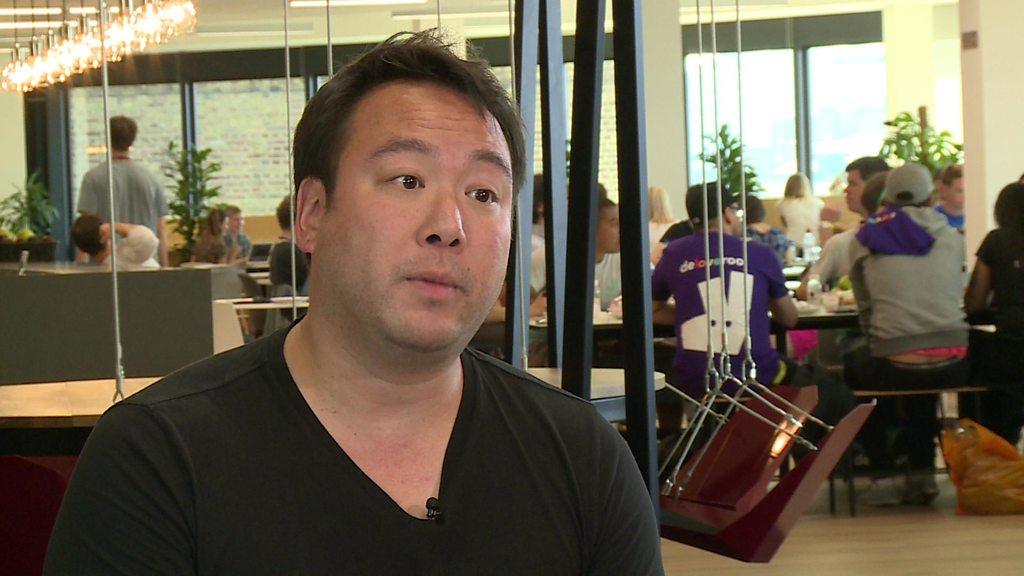Deliveroo opens door to benefits win for gig economy workers
- Published
- comments
Will Shu, Deliveroo's boss, says the law needs to change to catch up with the modern economy
The food delivery firm Deliveroo has said it will pay sickness and injury benefits to its 15,000 riders in the UK if the law is changed.
In a submission to the government's review of the "on-demand" economy seen by the BBC, the firm says that at present the law prevents it from offering enhanced rights because it classifies its riders as self-employed.
Deliveroo says it uses that classification to provide its riders with the flexibility to work when they want.
It says employment rules should be changed so that people who work for companies like Deliveroo and Uber can receive enhanced benefits and not lose that flexibility.
'Reclassified'
Sources say that the firm is willing to look at enhanced payments to riders to cover things like sickness pay - and that the money would probably be administered under a government controlled scheme similar to national insurance or pensions contributions.
It may mean that Deliveroo riders and others working for similar on-demand firms like Uber are "reclassified" as gig workers.
The move comes after a slew of criticism and court cases against gig economy companies over how they treat people who work for them.
"Central to our popularity with riders and our success as a business is the flexible nature of the work that we offer," the submission says.
"We want to offer riders more security.
"We believe everyone - regardless of their type of contract - is entitled to certain benefits, but we are constrained in offering these at the moment."
'Gig economy' workers 'should get minimum wage'
'Pay self-employed minimum wage'
At the moment "self-employed" workers in the gig economy do not have the right to sickness pay, holiday pay or maternity and paternity leave.
They also are not covered by the minimum wage rules.
That has led to criticism that the people who ride or drive for gig companies are actually "workers" and should receive a wide range of benefits.
There are also concerns that companies are exploiting loopholes in employment law and lack of enforcement to run their businesses profitably.
Deliveroo says that if it did offer "worker" contracts, flexibility, which is very popular with its riders, would be lost.
Deliveroo riders, for example, are allowed to work for other on-demand economy businesses at the same time.
This makes it impossible, the firm argues, to guarantee the minimum wage which is based on working for a single employer.

Deliveroo says its riders earn on average £9.50 an hour, £2 more than the National Living Wage.
The firm says it is wrong that riders are at present involved in a "trade-off" between flexibility in the way they work, and the security of full employment benefits.
Company sources have told me that, following moves on sickness pay, Deliveroo would be willing to look at holiday pay, pension rights and maternity and paternity entitlements.
Those rights could be "earned" by riders after a certain number of deliveries have been achieved.
'Trade-off'
"At present, companies in the UK are forced to class the people they work with as either 'employees', 'workers' or 'self-employed'," the submission says.
"Our riders are 'self-employed'. This gives them full flexibility - but the quid pro quo is that they are not entitled to certain benefits.
"In short, there is currently a trade-off between flexibility and security and we want to play our part in overcoming this divide."
Deliveroo is one of a new breed of "on-demand" firms which operate in what is known as the gig economy.
Riders for the firm - 60% of whom are under the age of 25 - log on to the company's digital platform and receive "jobs" delivering food, on a bike or a scooter.
Matthew Taylor, the head of the Royal Society of Arts, was asked by the government to review this new world of work, including the gig economy and zero hours contracts.
He is expected to publish his report imminently on how to reform employment law so that workers can be flexible without being exploited.
Update 10:30am
Deliveroo's announcement today has received pretty short shrift from the TUC. Here's general secretary Frances O'Grady on my story this morning:
"This reads like special pleading. There's nothing stopping Deliveroo from paying their workforce the minimum wage and guaranteeing them basic rights like holiday and sick pay.
"Plenty of employers are able to provide genuine flexibility and security for their workforce. Deliveroo have no excuse for not following suit.
"The company's reluctance to offer benefits now is because they want to dodge wider employment and tax obligations by labelling staff as self-employed."
Update: 13:04am
Here's another update. The boss of Deliveroo, Will Shu, has told me that the company is willing to go further than offering its riders sick pay and injury insurance.
I put it to him that the benefits debate in the gig economy went far further than sickness benefits and injury insurance, and asked whether the company would look at issues like pension payments and holiday entitlements.
"This is the beginning of the debate," Mr Shu told me.
"We sat down with - me personally - hundreds of riders and asked, what do you care most about today?
"It was sick pay and insurance for injury and that is what we are starting with. But we are open minded to different things."
That sounds like a yes, the company is willing to look at further benefit areas.
It will be interesting to see how Matthew Taylor's report, expected next week, deals with the issue of broader rights for gig workers.
I asked Mr Shu for his response to critics who say that the only way firms like his make money is by not paying national insurance payments for their riders, pension contributions and other benefits.
"Not at all," he answered.
"I understand [the criticism] - it is a new way of doing businesses.
"The on-demand economy in Britain is five or six years old and there are hundreds of thousands of people in it so the growth has been huge, and so it is understandable that people haven't understood the intricacies.
"At the end of the day though, let's take it back, it is a very different relationship than regular employment. People can come and go as they please.
"The issue is this - if we offer benefits to people the courts may reclassify self-employed people as workers thus robbing them of the flexibility they ultimately signed up for, for the job.
"What that practically means is that you would work on a shift pattern, you wouldn't log in and out as you please. It is a very different work relationship."
And would mean that Deliveroo wouldn't be, well, Deliveroo.
- Published7 July 2017

- Published5 July 2017
- Published4 July 2017